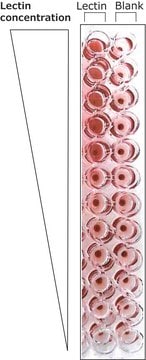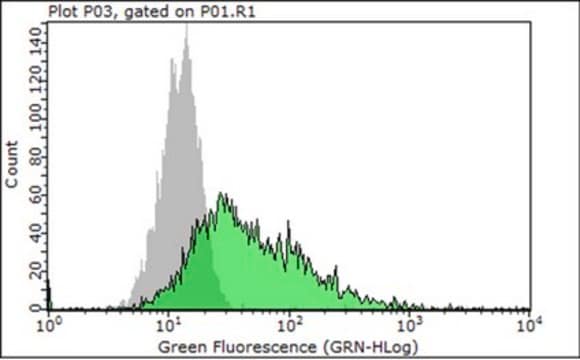175600
Angiogenin, Human, Recombinant, E. coli
Se connecterpour consulter vos tarifs contractuels et ceux de votre entreprise/organisme
About This Item
Code UNSPSC :
12352202
Produits recommandés
Pureté
≥95% (SDS-PAGE)
Niveau de qualité
Forme
solid
Fabricant/nom de marque
Calbiochem®
Conditions de stockage
OK to freeze
Impuretés
≤100 pg/μg Endotoxins (pg/μg Angiogenin)
Conditions d'expédition
dry ice
Température de stockage
−70°C
Description générale
Recombinant, human angiogenin expressed in E. coli. A 14 kDa protein with angeogenic and ribonucleolytic activities. Enhances the proteolytic and fibrinolytic activities of endothelial cells. Also, stimulates the endothelial cell invasion of Matrigel basement membrane. Has been shown to stimulate capillary and umbilical vein endothelial cells to produce DAG and secrete prostacyclin by phospholipase activation.
Recombinant, human angiogenin expressed in E. coli. Exhibits angiogenic and ribonucleolytic activities. Enhances the ability of endothelial cells to digest extracellular matrix components and degrade basement membrane. Has been shown to stimulate capillary and umbilical vein endothelial cells to produce DAG and secrete prostacyclin by phospholipase activation. Biological activity: 1.0 µg protein produces an absorbance change at 260 nm of approximately 2.0 - 3.0 as measured by yeast tRNA ribonucleolytic activity.
Actions biochimiques/physiologiques
≥1.0 µg protein produces an absorbance change at 260 nm of ~2.0-3.0 as measured based upon its ribonucleolytic activity toward Yeast tRNA.
Avertissement
Toxicity: Standard Handling (A)
Forme physique
Lyophilized from sterile-filtered PBS containing 50 µg BSA/µg Angiogenin.
Reconstitution
Following reconstitution, aliquot and freeze (-70°C). Stock solutions are stable for up to months at -70°C. Avoid freeze/thaw cycles of solutions.
Reconstitute to a concentration ≥1 µg/ml with sterile PBS containing ≥0.1% HSA or BSA.
Autres remarques
Leland, P.A., et al. 2002. Biochemistry41, 1343.
Hatzi, E., et al. 2000. Biochem. Biophys. Res. Commun. 267, 719.
Hu, G., et al. 1994. Proc. Natl. Acad. Sci. USA91, 12096.
Lee, F.S., and Vallee, B.L. 1989. Biochem. Biophys. Res. Commun.161, 121.
Kurachi, R., et al. 1985. Biochemistry24, 5494.
Hatzi, E., et al. 2000. Biochem. Biophys. Res. Commun. 267, 719.
Hu, G., et al. 1994. Proc. Natl. Acad. Sci. USA91, 12096.
Lee, F.S., and Vallee, B.L. 1989. Biochem. Biophys. Res. Commun.161, 121.
Kurachi, R., et al. 1985. Biochemistry24, 5494.
Informations légales
CALBIOCHEM is a registered trademark of Merck KGaA, Darmstadt, Germany
Code de la classe de stockage
11 - Combustible Solids
Classe de danger pour l'eau (WGK)
WGK 3
Certificats d'analyse (COA)
Recherchez un Certificats d'analyse (COA) en saisissant le numéro de lot du produit. Les numéros de lot figurent sur l'étiquette du produit après les mots "Lot" ou "Batch".
Déjà en possession de ce produit ?
Retrouvez la documentation relative aux produits que vous avez récemment achetés dans la Bibliothèque de documents.
Jürgen Krauss et al.
Methods in molecular biology (Clifton, N.J.), 525, 471-490 (2009-03-03)
ImmunoRNases represent a highly attractive alternative to conventional immunotoxins for cancer therapy. Quantitative production of immunoRNases in appropriate expression systems, however, remains a major challenge for further clinical development of these novel compounds. Here we describe a method for high-level
Notre équipe de scientifiques dispose d'une expérience dans tous les secteurs de la recherche, notamment en sciences de la vie, science des matériaux, synthèse chimique, chromatographie, analyse et dans de nombreux autres domaines..
Contacter notre Service technique






